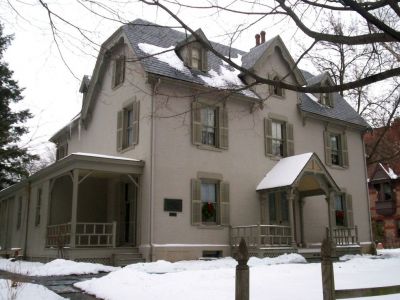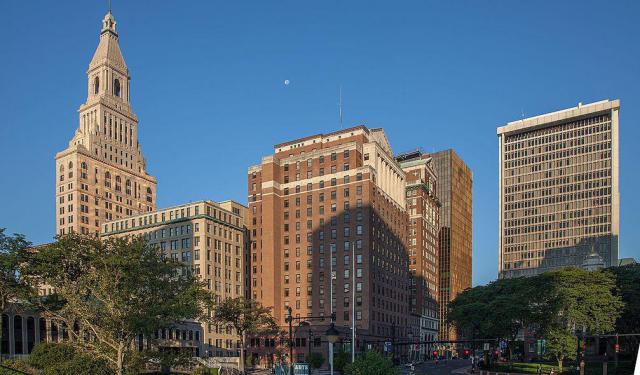Harriet Beecher Stowe House, Hartford (must see)
The Harriet Beecher Stowe House in Hartford is a historic house museum and National Historic Landmark that was home to one of America’s most influential writers. Located on Forest Street, right next to the Mark Twain House, this 5,000-square-foot, cottage-style residence was where Harriet Beecher Stowe-author of Uncle Tom’s Cabin-lived for the final 23 years of her life.
Built during the turbulent years of the American Civil War, the house reflects both the literary legacy and domestic life of its famous residents. Stowe herself oversaw much of its construction, joyfully immersed in the practical challenges of creating a home. In a letter to her publisher, she wrote with characteristic wit about her involvement: “I am busy with drains sewers sinks digging trenching-& above all with manure!” Despite the wartime shortages and setbacks, the house was sufficiently complete by spring 1864 for her to begin writing from its sunny bow window.
Architecturally, the two-story brick house stands on a brick foundation and features a mix of Gothic Revival and Italianate styles, with a jerkin-headed gable, hip-roof extension, and decorative elements like bargeboard trim and Italianate brackets. Inside, it follows a traditional center hall plan, with parlors, a dining room, a kitchen, and pantry on the ground floor, and bedrooms upstairs.
During her years in Hartford, Stowe remained a vital cultural figure. She wrote Pogunuc People (1878), went on lecture tours, advocated for the Wadsworth Atheneum, and helped found what is now the Hartford Art School at the University of Hartford. Her home became a place of literary creation, civic engagement, and family life until her death in 1896, in an upstairs bedroom surrounded by loved ones.
The Harriet Beecher Stowe House was added to the National Register of Historic Places in 1970 and declared a National Historic Landmark in 2013. Today, it is open to the public and serves as a place of education and remembrance, celebrating Stowe’s enduring impact on American literature and social reform.
Built during the turbulent years of the American Civil War, the house reflects both the literary legacy and domestic life of its famous residents. Stowe herself oversaw much of its construction, joyfully immersed in the practical challenges of creating a home. In a letter to her publisher, she wrote with characteristic wit about her involvement: “I am busy with drains sewers sinks digging trenching-& above all with manure!” Despite the wartime shortages and setbacks, the house was sufficiently complete by spring 1864 for her to begin writing from its sunny bow window.
Architecturally, the two-story brick house stands on a brick foundation and features a mix of Gothic Revival and Italianate styles, with a jerkin-headed gable, hip-roof extension, and decorative elements like bargeboard trim and Italianate brackets. Inside, it follows a traditional center hall plan, with parlors, a dining room, a kitchen, and pantry on the ground floor, and bedrooms upstairs.
During her years in Hartford, Stowe remained a vital cultural figure. She wrote Pogunuc People (1878), went on lecture tours, advocated for the Wadsworth Atheneum, and helped found what is now the Hartford Art School at the University of Hartford. Her home became a place of literary creation, civic engagement, and family life until her death in 1896, in an upstairs bedroom surrounded by loved ones.
The Harriet Beecher Stowe House was added to the National Register of Historic Places in 1970 and declared a National Historic Landmark in 2013. Today, it is open to the public and serves as a place of education and remembrance, celebrating Stowe’s enduring impact on American literature and social reform.
Want to visit this sight? Check out these Self-Guided Walking Tours in Hartford. Alternatively, you can download the mobile app "GPSmyCity: Walks in 1K+ Cities" from Apple App Store or Google Play Store. The app turns your mobile device to a personal tour guide and it works offline, so no data plan is needed when traveling abroad.
Harriet Beecher Stowe House on Map
Sight Name: Harriet Beecher Stowe House
Sight Location: Hartford, USA (See walking tours in Hartford)
Sight Type: Museum/Gallery
Guide(s) Containing This Sight:
Sight Location: Hartford, USA (See walking tours in Hartford)
Sight Type: Museum/Gallery
Guide(s) Containing This Sight:
Walking Tours in Hartford, Connecticut
Create Your Own Walk in Hartford
Creating your own self-guided walk in Hartford is easy and fun. Choose the city attractions that you want to see and a walk route map will be created just for you. You can even set your hotel as the start point of the walk.
Architectural Jewels
Hartford, Connecticut abounds in one-of-a-kind, artistically unique structures – homes, museums, libraries, and government halls – each with a distinctive look, appeal, and history of their own. Some of them are celebrated works by well-known architects, and display a variety of styles.
Among these jewels is Armsmear, a historic mansion originally built for Samuel Colt, the famed inventor... view more
Tour Duration: 2 Hour(s)
Travel Distance: 3.1 Km or 1.9 Miles
Among these jewels is Armsmear, a historic mansion originally built for Samuel Colt, the famed inventor... view more
Tour Duration: 2 Hour(s)
Travel Distance: 3.1 Km or 1.9 Miles
Hartford Introduction Walking Tour
Hartford, Connecticut is one of the oldest cities in the United States. Founded in 1635, this capital city of Connecticut has a long and storied history. The city offers a multitude of museums, a booming art scene, interesting architecture and excellence in cuisine.
The area where Hartford now sits was once home to Algonquins. More specifically, it was inhabited by the Massacoes, Podunks,... view more
Tour Duration: 1 Hour(s)
Travel Distance: 2.1 Km or 1.3 Miles
The area where Hartford now sits was once home to Algonquins. More specifically, it was inhabited by the Massacoes, Podunks,... view more
Tour Duration: 1 Hour(s)
Travel Distance: 2.1 Km or 1.3 Miles
Hartford's Historical Houses Tour
Visiting old houses is like treasure hunting, where you are bound to uncover secrets of the former owners. Hartford was once home to well-known historic figures, whose abodes today have been converted into museums for future generations to explore.
Among these is the Mark Twain House, a former residence of the iconic American author Samuel Clemens, better known as Mark Twain. This Victorian... view more
Tour Duration: 2 Hour(s)
Travel Distance: 3.6 Km or 2.2 Miles
Among these is the Mark Twain House, a former residence of the iconic American author Samuel Clemens, better known as Mark Twain. This Victorian... view more
Tour Duration: 2 Hour(s)
Travel Distance: 3.6 Km or 2.2 Miles






